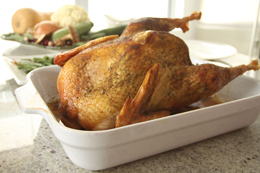People tend to turn their eyes towards the serving spoon and away from the scale this time of year. A common rationale: Why focus on healthy habits when you can indulge in holiday feasts and just make up for it come January? It doesn't need to be an "all or nothing" approach, and you can still enjoy the holiday season without throwing healthy habits to the wayside.
This year, there's another compelling reason not to turn a blind eye to holiday bingeing and its accompanying belly bulge: Whittling your waistline and cutting back on a common food additive may reduce your risk for developing kidney disease, according to new research published in the National Kidney Foundation's American Journal of Kidney Diseases.
The food additive -- phosphorus -- may not yet be on your radar, but it should be because it's already on your plate. It is naturally abundant in animal, dairy, and vegetable protein, and any food that has undergone processing may contain high levels. That's because in the United States phosphorus is added to many foods to help enhance their flavor and shelf life. It doesn't have a taste or smell, so it's important to know where to look for it. Phosphorus additives are indicated by the "PHOS" root word on nutrition labels.
Due to their chemical composition, phosphorus additives in processed foods are more readily absorbed by the body. Approximately 90-100 percent of phosphorus additives are absorbed compared with 50-60 percent of the phosphorus found in animal proteins and about 40 percent of the phosphorus in vegetable proteins. Plant-based forms of phosphorus are the least readily absorbed by the body because they are harder for humans to break down.
A good rule of thumb is that if the food comes in a package, it's likely to be high in phosphorus, so limit the processed foods in your diet and you may be able to reduce your risk of developing kidney disease. Not sure where to start? Here are five tips from the National Kidney Foundation (NKF) to protect your kidneys and limit your phosphorus this Thanksgiving and throughout the holiday season. With a few simple swaps, your holiday season will be tasty, filling and low in phosphorus. As with everything, moderation is key to healthy living!
- Let's Talk Turkey. It's good to fill up on lean protein, but it's important to know what else you may be eating along with it. On Thanksgiving and throughout the year, avoid buying pre-brined birds. Many people think that brining enhances the flavor and juiciness of the meat, and it can. But it's important to know that often a sodium-phosphate solution is injected into the turkey (or other meat) to achieve that flavor. You're better off creating your own flavorful turkey at home. NKF's Kidney Kitchen has a good recipe to help you get your turkey roasted and ready to serve in three hours or less, without added salt or phosphorus. Also, beware of the deli meats found on holiday buffets. These, too, are typically injected with a sodium-phosphate solution.
Wishing you and yours a very healthy, happy and low-phosphorus holiday season!
